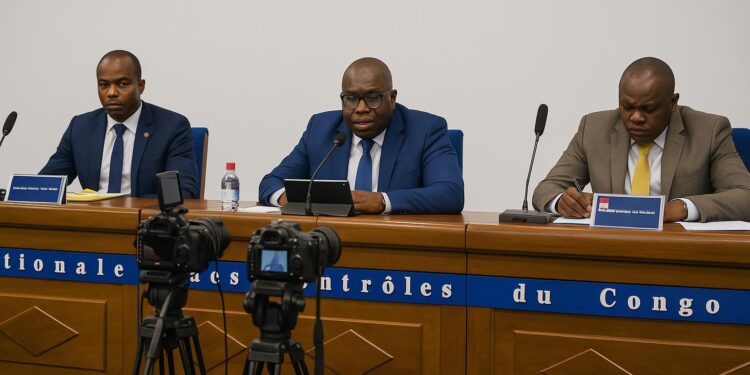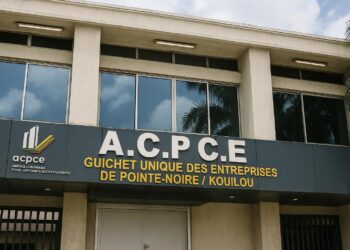Steering committee reviews mid-term progress
Meeting in Brazzaville on 9 October, the steering committee of the Project for Accelerating the Digital Transformation, PATN, examined two years of execution and concluded that the programme remains broadly on schedule, despite disbursements reaching only 40 % of the USD 100 million envelope.
The session, chaired by Planning Ministry adviser Sylvain Lékaka, was designed as a formal mid-term review, allowing members to identify bottlenecks, re-prioritise sub-projects and align work streams with the country’s Vision Congo Digital 2030 strategy that the cabinet is expected to endorse soon.
Project coordinator Michel Ngakala described the exercise as a chance ‘to examine what worked and what did not, so the impacts ultimately reach citizens’. His remarks underline the administration’s determination to treat connectivity as an economic enabler rather than a purely technological undertaking (PATN communiqué).
Four strategic objectives toward 2027
Following deliberations, the steering committee agreed on four headline goals for the remaining life of the project: accelerate nationwide broadband roll-out; consolidate the legal, regulatory and institutional architecture of the digital economy; operationalise the African Centre for Artificial Intelligence Research; and upgrade digital skills infrastructure.
In practical terms, that means completing fibre backbones linking Brazzaville, Pointe-Noire and fourteen inland départements, introducing a modern data-protection regime aligned with the African Union’s Malabo convention, equipping the Caria hub in Oyo, and financing additional labs at Marien-Ngouabi and Denis-Sassou-Nguesso universities.
Officials also emphasised the importance of maintaining an open-access model for backbone infrastructure to crowd-in private investment. ‘State resources alone cannot meet coverage targets; we must catalyse operators and investors,’ argued digital economy adviser Brice Koumba, echoing positions outlined in the World Bank appraisal report (2021).
Funding landscape and disbursement pace
PATN is jointly financed by a USD 80 million International Development Association credit and a EUR 20 million European Union grant, structured to be drawn over five years. As of September, roughly USD 40 million had been disbursed, mainly for connectivity studies, pilot links and equipment procurement.
The disbursement ratio is considered adequate by multilateral standards, yet the committee wants accelerated tendering so civil-works contracts start before the next rainy season. Procurement reforms adopted by cabinet in July should shorten bid evaluation cycles from six months to an estimated ninety days.
World Bank country manager Cheick Fantamady Kanté welcomed the new timetable, noting that ‘swift execution will translate connectivity improvements into productivity gains, especially for small-scale enterprises’ (World Bank country office). Market analysts in Pointe-Noire add that faster build-out could de-risk upcoming 4G spectrum auctions.
Legal reforms and data governance
One immediate recommendation is to finalise draft decrees on personal data protection and to initiate parliamentary discussions before the end of the current session. The texts, prepared with EU technical assistance, would create an independent supervisory authority and define cross-border data-transfer conditions.
The steering committee equally instructed the Ministry of Posts, Telecommunications and Digital Economy to modernise the legal framework for digital identity. The reform will underwrite the planned e-civil registry, enabling secure issuance of birth certificates, passports and social-security numbers through a single interoperable platform.
Industry observers say a robust identity layer can reduce fraud in mobile-money ecosystems and ease customer-due-diligence obligations for commercial banks, thereby expanding financial inclusion. The banking association has already signalled readiness to connect to the identity gateway once standards have been promulgated.
Skills pipeline and AI research hub
The African Centre for Artificial Intelligence Research, or Caria, remains the most emblematic component. Construction of its cloud-ready data centre is finished, but the facility still needs high-performance computing equipment and a satellite uplink to guarantee redundancy, according to project engineers.
PATN allocates USD 6 million for the centre’s operationalisation, including fellowships for thirty doctoral candidates and visiting-researcher programmes with regional universities. Rector of Marien-Ngouabi Florence Ango hailed the opportunity to ‘anchor talent at home and produce solutions adapted to Central African languages and datasets’.
Beyond Caria, the roadmap earmarks resources to refurbish computer labs in twenty-five public vocational schools and to design short courses in coding, data analytics and cybersecurity. These interventions will be coordinated with the AfDB-funded SME productivity project to maximise spillovers into the private sector.
Outlook for investors and society
With the revised matrix in place, authorities express confidence the four objectives can be met by December 2027. Success would raise the national internet-penetration rate from 35 % to 65 %, halve average retail data prices, and push Congo ten places higher in the UN e-Government index.
For investors, a denser backbone and clearer rules of the game could open room for data-centre ventures, fintech platforms and public-private partnerships in e-services. The steering committee plans quarterly performance dashboards to keep financiers, development partners and the diaspora informed as milestones are achieved.












































